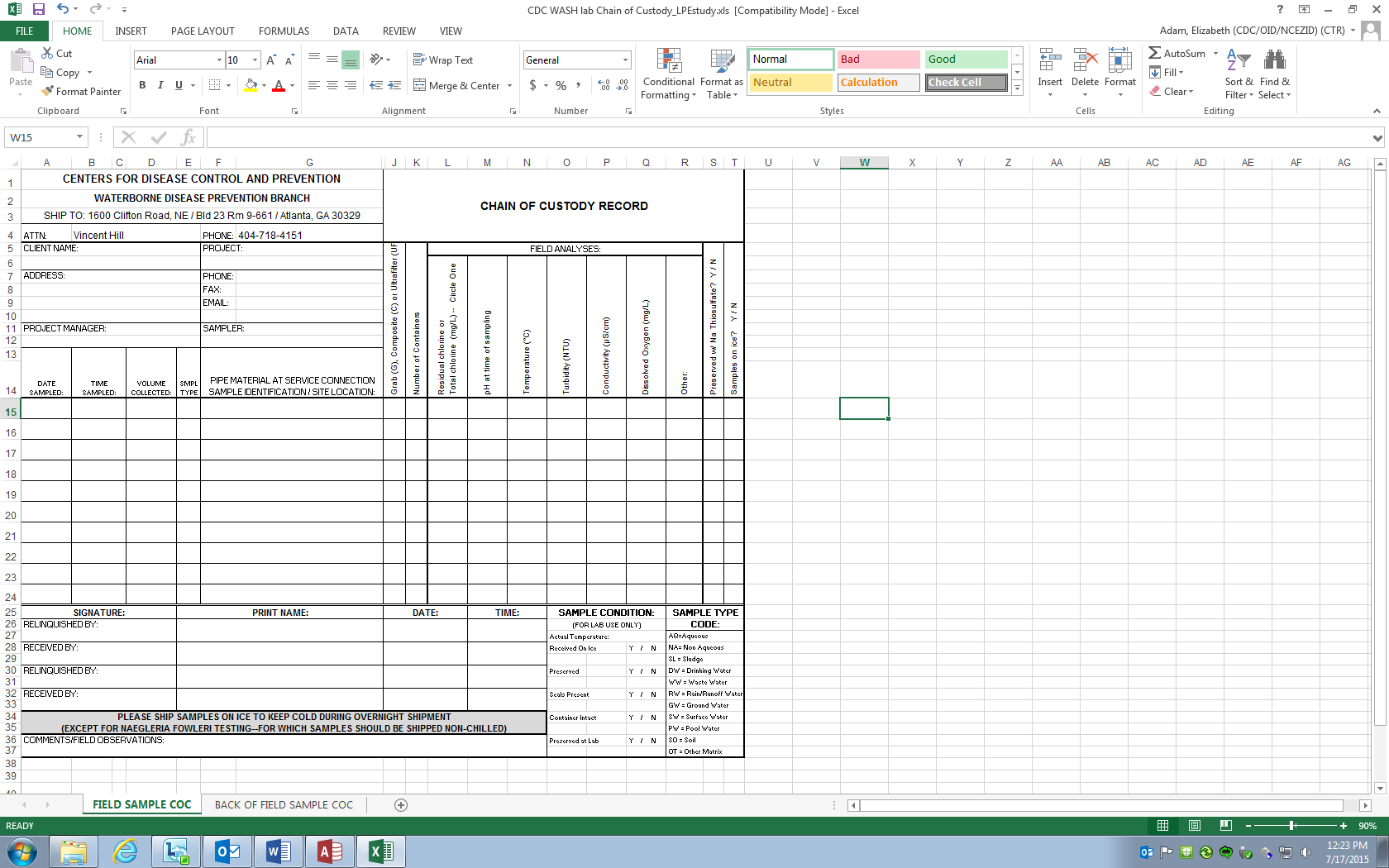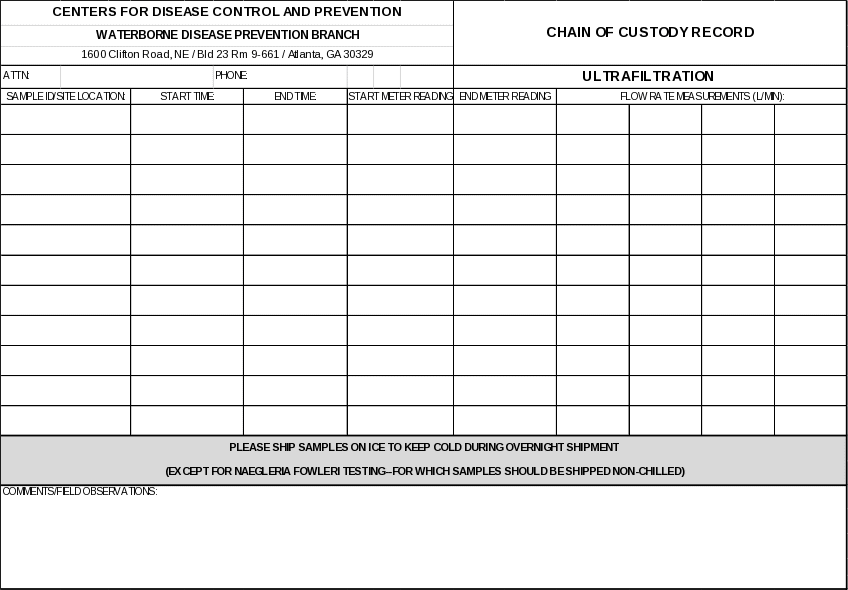Form 0920-0960 LOW PRESSURE EVENT FORM
Epidemiologic Study of Health Effects Associated with Low Pressure Events in Drinking Water Distribution Systems
P. LPE Form
Low Pressure Event Form - Grab Samples
OMB: 0920-0960
Attachment P Form Approved
OMB No. 0920-0960
Exp. 03/31/2016
Utility Name __________________ Utility ID __________________ CDC Event ID________________
|
|||||
1. Does this event affect at least 10 residential units? ⃝ Yes (Please continue to question 2) ⃝ No (This event is not eligible for study) |
|||||
2. Briefly describe what happened during the event ___________________________________________________________________________________________________________ |
|||||
___________________________________________________________________________________________________________ |
|||||
___________________________________________________________________________________________________________ |
|||||
___________________________________________________________________________________________________________ |
|||||
___________________________________________________________________________________________________________ |
|||||
___________________________________________________________________________________________________________ |
|||||
c |
3a. When was emergency reported? Date ________Time ___________ |
||||
4. Event type |
4a. What type of break? (mark all that apply) |
||||
c20a.
What type of water?
_____________________________________ |
⃝ Circumferential |
⃝ Joint |
|||
⃝ Planned repair |
⃝ Longitudinal |
⃝ Split at Corporation |
|||
⃝ Supply disruption (describe below) |
⃝ Blowout |
⃝ Sleeve |
|||
_________________________________________ |
⃝ Other _____________________________________________________ |
||||
⃝ Other ___________________________________ |
_____________________________________________________ |
||||
5. When did repair/maintenance crew arrive on site? |
4b. What factors contributed to the break? (mark all that apply) |
||||
Date _________________Time _______________ |
⃝ Defective part |
⃝ Deterioration |
|||
6. When was repair/maintenance completed? |
⃝ Corrosion |
⃝ Excessive operating pressure |
|||
Date _________________Time _______________ |
⃝ Pumping changes |
⃝ Water hammer (surge) |
|||
7. Main housing type in affected area |
⃝ Vehicle accident |
⃝ Contractor main break |
|||
⃝ Single family homes (detached) |
⃝ Differential settlement |
⃝ Temperature change |
|||
⃝Duplexes/townhomes (attached) |
⃝ Other ___________________________________________________ |
||||
⃝Apartments/condos |
8. Location of work site (address)____________________________________ |
||||
⃝ Mobile homes |
(cross streets) ______________________ ________________________ |
||||
⃝ Other_______________________________________ |
(GPS coordinates) (Lat.) _______________ (Long.) ___________________ |
||||
INFRASTRUCTURE AND WATER INFORMATION |
|||||
9. Pipe diameter ___________ Inches |
13. Soil type (for example, sand, clay, rock backfill)___________________________________ |
||||
10. Pipe age ___________ Years |
14. Pipe interior |
||||
11. Pipe depth _____Feet ___Inches |
14a. Tuberculation 1 2 3 4 5 |
||||
12. Pipe material |
|
|
(smooth) (highly tuberculated) |
||
⃝ PVC |
⃝ Concrete |
⃝ Asbestos Cement |
14b. Describe sediment or biofilm______________________________ |
||
⃝ Ductile Iron |
⃝ Cast iron |
⃝ Wood |
__________________________________________________________ |
||
⃝ Galvanized |
⃝ HDPE |
⃝ Steel |
15. Source water type ⃝ Surface water ⃝ Groundwater ⃝ Mixed |
||
⃝ Don’t know |
⃝ Other_________________________ |
16. Name of water storage facility, well, or plant serving area |
|||
|
________________________________________________________________________ |
||||
|
|||||||||
17. How was low pressure verified? ⃝ Pressure readings ⃝ Verified at hose bibs (ground-level) ⃝ Customer complaint ⃝ Assumed (describe why) ____________________________________________________________________________________ |
|||||||||
18. Pressure readings |
|||||||||
Suggested reading locations |
Location of reading (cross-streets, address, GPS coordinates) |
Pressure during event (psi) |
Date and time |
Pressure after cleanup (psi) |
Date and time |
||||
Near break/repair |
|
|
|
|
|
||||
Upstream |
|
|
|
|
|
||||
Downstream |
|
|
|
|
|
||||
REPAIR INFORMATION |
|||||||||
19. Was the repair site valved off? ⃝ No ⃝ Completely valved off ⃝ Partially valved off |
|||||||||
20. What repair or maintenance activities occurred? (mark all that apply) ⃝ Repair existing main ⃝ Replace existing main |
|||||||||
⃝ Add new pipes to distribution system ⃝ Fix cross-connection ⃝ Exercise valves ⃝ Flush Hydrant |
|||||||||
⃝ Cut open main for reasons other than pipe work (for example, install valve) ____________________________________________ |
|||||||||
⃝ Other (describe)__________________________________________________________________________________________ |
|||||||||
21. What type of repair was conducted? ⃝ Clamp repair ⃝ Cut and replace section of pipe ⃝ Replace or repair fitting |
|||||||||
⃝ Other (describe)__________________________________________________________________________________________ |
|||||||||
c20a.
What type of water?
_____________________________________ |
22a. Describe water (rain, sewage, leakage from system) _________________________________________________________ |
||||||||
23. Describe precipitation while the main was being repaired ⃝ Heavy Rain ⃝ Light Rain ⃝ Snow or Sleet ⃝ None |
|||||||||
c20a.
What type of water?
_____________________________________ |
24a. Describe location, breaches, leaks |
||||||||
_________________________________________________________________________________________________ |
|||||||||
c20a.
What type of water?
_____________________________________ |
25a. Describe location, breaches, leaks |
||||||||
_________________________________________________________________________________________________ |
|||||||||
26. Were replacement parts swabbed prior to being installed? ⃝ Yes ⃝ No ⃝ N/A |
|||||||||
27. Was the main flushed before being brought back into service? ⃝ Yes ⃝ No ⃝ N/A |
|||||||||
27a. Describe flushing process (for example, estimated velocity and duration) ___________________________________________ |
|||||||||
28. Was the main chlorinated before being brought back into service? ⃝ Yes ⃝ No ⃝ N/A |
|||||||||
28a. Chlorination method and dose? (slug dose, swabbing, 100 mg/L, 25 mg/L) ________________________________________________________ 28b. Disinfectant residual of bulk water in the main before being brought into service? _____________ |
|||||||||
EVENT IMPACT |
|||||||||
29. Number of households that experienced low pressure _______ 29a. Duration of low pressure ______ hrs. ______ min. |
|||||||||
c20a.
What type of water?
_____________________________________ |
30a. Num. of households lost service __________ |
||||||||
(include total time of loss of service, before and after area valved off) |
30b. Duration of lost service ______ hrs. ______ min. |
||||||||
c20a.
What type of water?
_____________________________________ |
31a. Main lines closed? ⃝ Service branches to homes closed? ⃝ |
||||||||
31b. Num. of households out of service__________ |
31c. Duration of shutoff ______ hrs. ______ min. |
||||||||
32. Was a boil-water advisory (BWA) or notice administered as a result of this event? ⃝ Yes ⃝ No |
|||||||||
33. Based on your observations, do you think there was any potential for contamination? ⃝ Yes ⃝ No ⃝ Unsure |
|||||||||
33a. Please explain why you selected yes, no, or unsure:____ _____________________________________________________ |
|||||||||
__________________________________________________________________________________________________________ |
|||||||||
34. Do you have any other comments about the low pressure event? ________________________________________________ |
|||||||||


Public reporting burden of this collection of information is estimated to average 45 minutes per response, including the time for reviewing instructions, searching existing data sources, gathering and maintaining the data needed, and completing and reviewing the collection of information. An agency may not conduct or sponsor, and a person is not required to respond to a collection of information unless it displays a currently valid OMB control number. Send comments regarding this burden estimate or any other aspect of this collection of information, including suggestions for reducing this burden to CDC/ATSDR Information Collection Review Office, 1600 Clifton Road NE, MS D-74, Atlanta, Georgia 30333; ATTN: PRA (0920-0960).
| File Type | application/vnd.openxmlformats-officedocument.wordprocessingml.document |
| Author | Elizabeth Adam |
| File Modified | 0000-00-00 |
| File Created | 2021-01-20 |
© 2026 OMB.report | Privacy Policy
 LOW
PRESSURE EVENT FORM
LOW
PRESSURE EVENT FORM

 WATER
PRESSURE
WATER
PRESSURE
